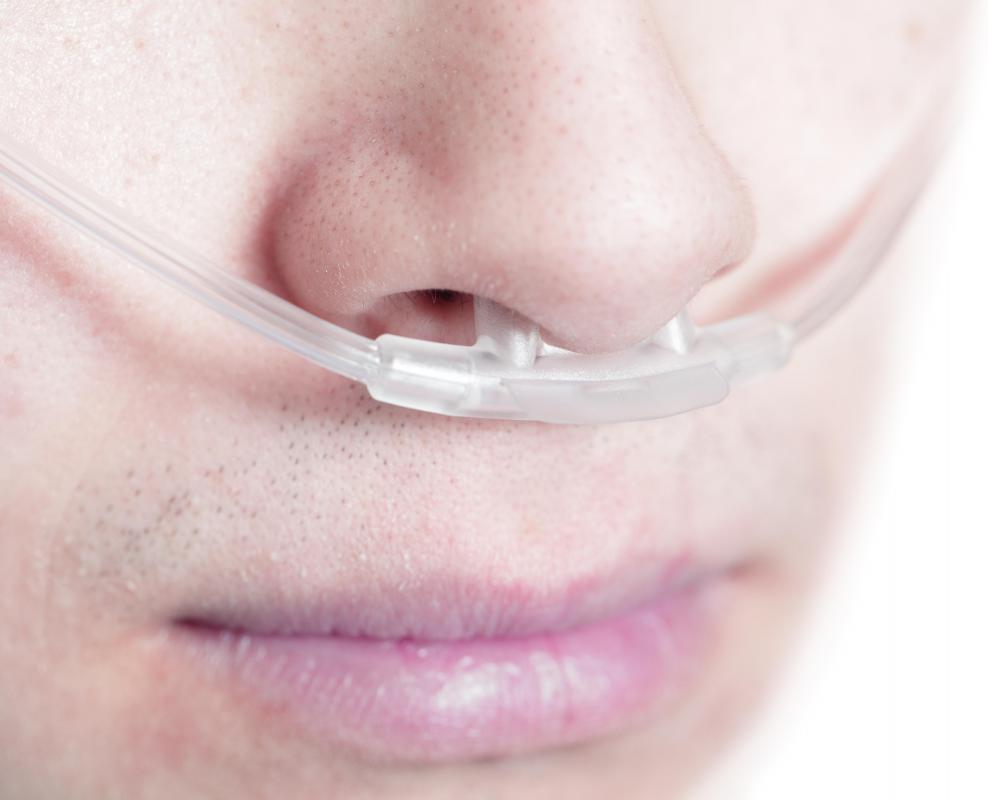At WiseGEEK, we're committed to delivering accurate, trustworthy information. Our expert-authored content is rigorously fact-checked and sourced from credible authorities. Discover how we uphold the highest standards in providing you with reliable knowledge.
What is Anoxia?
The body needs oxygen to function properly and survive. When the body’s tissues are lacking oxygen, the condition that results is referred to as anoxia. There are many causes of anoxia, such as the inhalation of harmful gases, injuries, diseases, and poisoning. In some cases, it occurs during childbirth. For example, a newborn’s brain may be injured during childbirth, leading to this diagnosis.
Organs rely on adequate blood flow, which provides them with required oxygen. In some cases, an organ may receive a normal level of blood flow that fails to deliver the needed oxygen. When there is a lack of oxygen to the body tissues, a person may be diagnosed with anoxia. Sometimes, this condition is confused with hypoxia, which is related but not the same. Hypoxia is marked by a decrease in the amount of oxygen delivered to body tissues while anoxia is the absence of oxygen to body tissues.

There are numerous conditions and events that may cause a person to suffer from anoxia. For example, it may occur as the result of strangulation or as the result of the inhalation of smoke or harmful gases. Sometimes it occurs as the result of a serious infection or illness. It may, for example, occur when a person has encephalitis or severe asthma; a heart attack can cause it as well. Anoxia may also be the result of a serious injury, intake of poison, faulty administering of an anesthetic, or exposure to high altitudes.

The symptoms of anoxia can include confusion and coma. An individual may also experience a stiff neck or have uncontrollable muscle spasms; seizures may occur as well. If a person has hypoxia, which is partial oxygen deprivation, he may experience dizziness, sleepiness, tingling sensations, and an increased breathing rate. His skin may take on a bluish coloring, and he may experience odd changes in behavior. For example, he may seem euphoric for no apparent reason.

If a patient is diagnosed with anoxia, doctors usually administer oxygen in order to restore its availability to the body tissues. Next, doctors typically try to treat the underlying cause of the condition. For example, if the problem is heart related, doctors may use medication to support the heart. On the other hand, if the underlying cause is poisoning, doctors may administer an anecdote to treat it. Recovery from this condition depends on the success doctors have with treating its cause and the extent of the tissue damage that has resulted from the lack of oxygen.
AS FEATURED ON:
AS FEATURED ON:


















Discussion Comments
My friend's daughter has developmental delays because she had anoxia at birth. Her umbilical cord was tangled around her neck. My friend had to have an emergency c-section because of it. They did their best to get the baby out but some brain damage took place.
@MikeMason-- That sounds scary.
I don't think you will have anoxia from an anxiety attack unless you also have asthma. Try to stay calm when it happens and remember that it's temporary.
I used to suffer from asthma that had psychological causes. Anoxia was one of my fears too. Aside from taking my medication right away, counting to twenty and breathing into a paper bag really helps in these situations because it slows down breathing and allows us to get oxygen.
I'm scared that I will develop anoxia one day and die. I have an anxiety disorder and experience anxiety attacks when I'm stressed. I develop hypoxia during my anxiety attacks. My head becomes tingly and my limbs go numb. It feels like I can't breathe and I hyperventilate which doesn't help. The attack usually ends with me fainting. It's very scary for me and for the people around me.
Post your comments